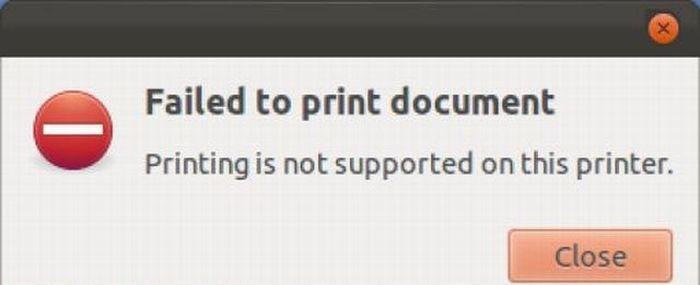Ranter
Join devRant
Do all the things like
++ or -- rants, post your own rants, comment on others' rants and build your customized dev avatar
Sign Up
Pipeless API

From the creators of devRant, Pipeless lets you power real-time personalized recommendations and activity feeds using a simple API
Learn More
Comments
-
@jespersh Purgatory...
But then some whiny bitches will start crying again I guess.
I just don't understand how a distributor can still support this. -
I guess that's for Ubuntu core support for legacy devices that barely exist anymore in production?
-
@gitpush why... should a distribution support hardware older than 25 years?
Just why...
Especially when 32 bit support is fading away and there's literally only self built frankensteens who could run on such a system? (Architecture wise - you'll won't find an amd64 system with EISA... ) -
What's wrong with having excessive legacy support? I mean it's not like it's eating your food or stealing your car. It just... Exists
-
@IntrusionCM No clue lol but if it isn't loaded by default then I don't see a problem tbh
-
@netikras mostly performance. you can severely cut down boot time.
out of kernel perspective: a lot of this (eg look at the removal of AGP) is not only legacy, but is cumbersome - as not even testable due to missing hardware or requiring quirks / hacks / workarounds noone understands nowadays....
I'm not against legacy support per se, but in case of EISA or AGP: it's dead. PCI(X) has won.
Even floppy support was reworked not long ago....
I really think that a whole lot of developer time could be spent better if there was a clean break and cruft was removed. -
-
@IntrusionCM
> you can severely cut down boot time
what kind of numbers are we talking about? Unless it's >1 second I don't give a damn -
@gitpush thx. :) Sorry for being bit unclear, brain is melting.
Too warm.
Too many numbers.... And too many NUMA calculations for CPU pinning. -
@netikras will take a look tomorrow.
Guess I'll rebuild the official sources with a slim specific config and try to create an auto build job
But 1 sec? Sounds more than doable... VM's are pretty slim.
I'll post tomorrow my findings.... -
 Parzi81526ySome of these archaic busses are in use today, actually, they're just not user-accessible. Stuff like low-speed I/O and RGB and most TPMs are on a modified ISA bus even today, and CPUs even use them for totally on-die purposes.
Parzi81526ySome of these archaic busses are in use today, actually, they're just not user-accessible. Stuff like low-speed I/O and RGB and most TPMs are on a modified ISA bus even today, and CPUs even use them for totally on-die purposes.
I'm guessing that's why they're still included.
(Also ubuntu isn't reliable at all lmao, it's the bloated corpse of a Debian kernel) -
REEEEEE old code REEEEE must delete must delete REEEEE it's probably as shitty as my own fucking code from just last month REEEEEE
-
@Parzi isn't that LPC?
Well .. i dislike Ubuntu, too.
But that was not my decision.
I've started with Ubuntu Base and have now a solid minimal system -
@Fast-Nop Here's some crisco.
Apply it to your burned butt, seems like some major trauma based on ya comment -
@IntrusionCM It just matches the stupidity of your rant, which you probably don't realise.
-
 Parzi81526y@IntrusionCM LPC is a modded ISA bus without a few features and hardcoded endpoints, but yes. Some modern CPUs do actually still use dynamic endpoints on LPC so in theory you could still use ISA stuff on modern systems...
Parzi81526y@IntrusionCM LPC is a modded ISA bus without a few features and hardcoded endpoints, but yes. Some modern CPUs do actually still use dynamic endpoints on LPC so in theory you could still use ISA stuff on modern systems... -
@Fast-Nop as u didn't explain, but rather threw a tantrum like a teething 4 year old, yes... I don't understand why you think my rant is stupid.
-
@projektaquarius that makes more sense.
After Reading @Parzi comments I looked up the topic. Seems like it's possible to still get an ISA mainboard now adays.... Which is.... Somehow terrifying.
16 bit: 5,33 MByte/s @ 8 MHz
I'd highly doubt that - especially since it is government / military or industrial embedded - those PCs run on Ubuntu, or even on an default kernel.
Rather some frankensteen of closed source modified 2.X kernel with integrated proprietary drivers noone dares to touch because it would explode right in their faces. -
 bjoer751766y@IntrusionCM well, here's the reason EISA is still supported in Linux
bjoer751766y@IntrusionCM well, here's the reason EISA is still supported in Linux
http://lkml.iu.edu/hypermail/linux/...
There has been tries to remove it after, but they all come down to someone stating they have EISA equipment they would like to be able to use - and Linus being the nerd he is, thinks it's fun to support those users.
And, since the sysfs rewrite of the EISA support, it's really low on resources. Especially if you have no EISA stuff connected... -
@IntrusionCM you would be surprised. Used to work for a defense contractor. They were using some tech in their "modern" platforms that's over 30 years old.
-
 SomeNone6716yOld stuff stays in the kernel if there is a maintainer.
SomeNone6716yOld stuff stays in the kernel if there is a maintainer.
If you don't like it, compile your own kernel with only what you need. It's free software, after all.
Related Rants

 W...w...wha...whaaat?!
W...w...wha...whaaat?! Found this in our codebase, apparently one of my co-workers had written this
Found this in our codebase, apparently one of my co-workers had written this
Ubuntu has integrated EISA support in kernel...
It's time to find a reliable kernel source that does not support hardware that is dead > 25 years.... Sheesh...
rant
bitrot
ubuntu
wtf
eisa